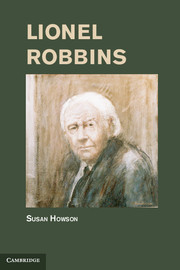Book contents
- Frontmatter
- Contents
- Illustrations
- Abbreviations
- Introduction
- One Father and Son
- Two The Great War
- Three Postwar
- Four The London School of Economics
- Five Iris Gardiner
- Six New College Oxford
- Seven The Young Professor
- Eight Fritz and Lionel
- Nine The School in the Mid-1930s
- Ten The Approach of War
- Eleven The Economics of War
- Twelve Director of the Economic Section
- Thirteen Anglo-American Conversations
- Fourteen The Law Mission and the Steering Committee
- Fifteen 1 9 4 4
- Sixteen The Last Months of the War
- Seventeen The Postwar Settlement
- Eighteen Return to the School
- Nineteen The End of the Transition
- Twenty LSE in the Early 1950s
- Twenty-One Chairman of the National Gallery
- Twenty-two Lord Robbins
- Twenty-three The Robbins Report
- Twenty-four The Sixties
- Twenty-five The Arts
- Twenty-six The Troubles at LSE
- Twenty-seven Retirement
- Conclusion
- Bibliography
- Index
Eighteen - Return to the School
Published online by Cambridge University Press: 07 October 2011
- Frontmatter
- Contents
- Illustrations
- Abbreviations
- Introduction
- One Father and Son
- Two The Great War
- Three Postwar
- Four The London School of Economics
- Five Iris Gardiner
- Six New College Oxford
- Seven The Young Professor
- Eight Fritz and Lionel
- Nine The School in the Mid-1930s
- Ten The Approach of War
- Eleven The Economics of War
- Twelve Director of the Economic Section
- Thirteen Anglo-American Conversations
- Fourteen The Law Mission and the Steering Committee
- Fifteen 1 9 4 4
- Sixteen The Last Months of the War
- Seventeen The Postwar Settlement
- Eighteen Return to the School
- Nineteen The End of the Transition
- Twenty LSE in the Early 1950s
- Twenty-One Chairman of the National Gallery
- Twenty-two Lord Robbins
- Twenty-three The Robbins Report
- Twenty-four The Sixties
- Twenty-five The Arts
- Twenty-six The Troubles at LSE
- Twenty-seven Retirement
- Conclusion
- Bibliography
- Index
Summary
When Lionel Robbins returned to academic life he was, he warned Iris on 9 December 1945, ‘changing my way of life again & it will all be strange & perhaps something of an anticlimax’. Beyond the immediate task of preparing new lectures, he had to resume his position as the senior professor of economics at LSE and rebuild the depleted department after its wartime losses of staff. He could no longer be the ‘young professor’ hardly older than the junior lecturers; he was now (almost) an elder statesman: to students like Ralph Turvey coming from LSE in Cambridge, where Hayek had been in charge of the Economics Department, he was a ‘strange figure coming from the real world of Whitehall’. He also had to reestablish his own intellectual reputation in the profession. The first task he found congenial but the first few months were disturbed by personal sadness; the second went well at first but was then made harder by the losses of close colleagues in 1947 and 1950; it was not until his first (and only) sabbatical leave in 1950 that he set to work in his new chosen field, the history of economic thought. Until then he drew heavily on his wartime experience to make his way back into academic economics; at the same time he was deeply worried and increasingly distracted by the deteriorating UK economy and the economic and financial policy of the postwar Labour government. This chapter covers the first two years of this transitional period. In the following two and a half years, the subject of the next chapter, he managed in spite of heavy teaching and administrative duties to return to the States three times, a habit he would have liked to continue.
On 21 February Lionel wrote to Maynard Keynes (Keynes BA/1). After commenting that ‘after all our anxieties, I was able to walk out a free man just at the moment at which I should always most have wished to be able to go’, he told him that since then he had been nursing his sprained ankle and ‘reading the latest textbooks & articles with the enthusiasm of a fresher. How good it is to come back to one’s subject after a really long break with all the cobwebs of habit & past prejudice blown out of one’s head. I don't know how I shall like the School – which has suffered much during its years of exile. But I like reading my books and preparing new courses of lectures far more than I should have imagined likely.’
- Type
- Chapter
- Information
- Lionel Robbins , pp. 642 - 680Publisher: Cambridge University PressPrint publication year: 2011

